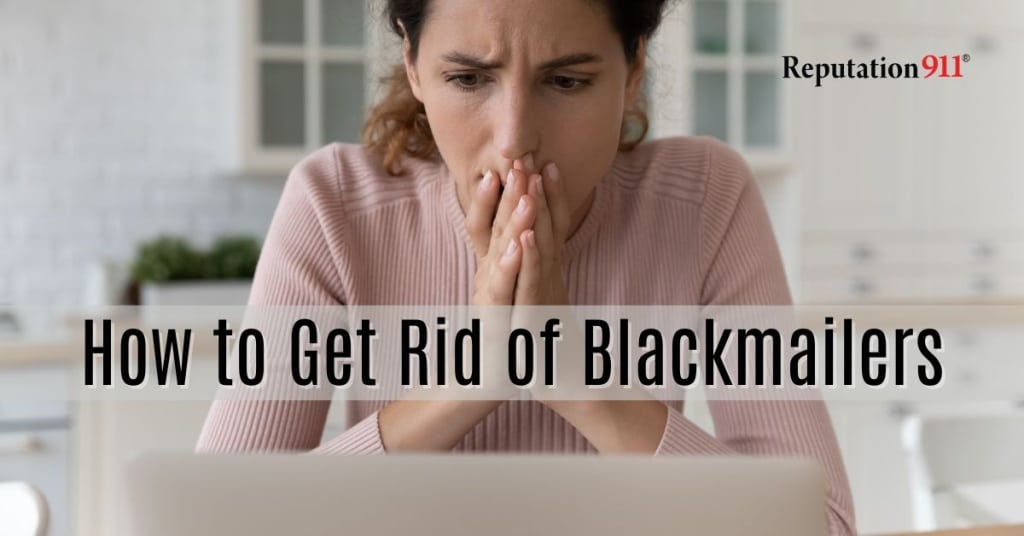Every year, countless individuals fall victim to online blackmail schemes. When this happens, victims can feel trapped and unsure of what to do next.
Online blackmail is emotionally, financially, and reputationally damaging. But, you are not powerless. With the right steps, you can regain control and protect your privacy.
In this blog post, you’ll learn actionable steps to deal with online blackmail, protect your reputation, and regain control.
If someone is blackmailing you online, take these steps immediately:
- Cut off communication: Block the blackmailer to avoid escalating the situation.
- Secure your accounts: Change passwords and enable two-factor authentication on all accounts.
- Document everything: Take screenshots of messages, emails, and threats for evidence.
- Report the incident: Contact the Internet Crime Complaint Center (IC3), local law enforcement, and relevant social media platforms.
- Confide in someone you trust: Share your situation with a trusted friend, family member, or therapist for support.
What is Online Blackmail?
Online blackmail, or cyber extortion, is a crime in which someone threatens to release sensitive private information about you.
This could include intimate images, videos, or other personal information you wouldn’t want in the public eye.
Blackmailers threaten to share this information unless you fulfill their demands. They exploit fear and shame to target their victims.
Demands can include requests for money, additional sensitive content, or even compliance with specific actions.
How blackmailers get private information:
Blackmailers use a variety of tactics to gain your information, including:
- Social media. Your social media profiles have a lot of personal information about you, which blackmailers can use.
- Dating apps. Catfishers use fake profiles to gain your trust. If you send them any intimate photos, they can use these as leverage against you.
- People finder sites. Many websites host your information like court documents, contact details, and more. Blackmailers can search through these and gain access to your information.
- Phishing scams. These are emails or texts that appear to be from a legitimate source, like your bank. They can trick you into revealing passwords or even credit card details.
- Data breaches. When hackers gain access to company information, your email addresses, passwords, and phone numbers are at risk.
- Spyware or malware. This is software hackers install on your computer that can capture keystrokes, webcam videos, or access files.
5 Steps to Get Rid of a Blackmailer Now
1: Cut off communication & block them
The first step to deal with blackmailing threats is to cut off contact and block them immediately.
Do not plead with, negotiate with, or challenge them. This can escalate the situation and give them more power over you.
Blocking the blackmailer limits their access to you, making them unable to continue their threats. While it won’t stop their existing demands, it can buy you time and minimize their influence.
Steps to Take:
- Social media: Use the “block” or “report” features on all social media platforms you use. This prevents them from sending messages, commenting, or viewing your profile.
- Email & phone numbers: Use your email provider’s tools to block their address. Block their phone number on your device to stop calls and texts.
- Secure your accounts: Change passwords on all accounts they might have accessed or threatened to compromise. Enable two-factor authentication to add an extra layer of security.
- Hide your personal information: Adjust privacy settings to hide your friends list and contact details from public view. Remove identifying information, like your email address or phone number, from public profiles.
2: Document all evidence of blackmail
Saving evidence is critical for reporting the crime, pursuing legal action, and protecting yourself.
Here’s how to effectively gather and store evidence:
- Take screenshots: Save all messages, emails, and threats. Capture timestamps and usernames for context.
- Archive links: Use tools like the Wayback Machine to find old webpages or social media posts.
- Save files securely: Store evidence in an encrypted folder or cloud storage.
- Keep a timeline: Record dates, times, and details of all interactions to establish a clear chronology.
- Gather blackmailer details: Document any identifying information, such as email addresses, usernames, or account links.
3: Report the blackmail to relevant authorities
Reporting the blackmail to relevant authorities and platforms will help you address the issue and protect yourself.
It may feel daunting, but this can help hold blackmailers accountable and prevent them from targeting others.
Steps to Take:
- Contact local law enforcement and file a report.
- Report the blackmail online with the Internet Crime Complaint Center (IC3).
- Report the blackmailer’s account on the platform where the incident occurred. Platforms like Facebook, Instagram, Twitter, and Gmail have dedicated tools for reporting harassment, blackmail, or account compromise.
- Keep a record of all reports filed, including confirmation emails or case numbers from law enforcement and online platforms.
4: Seek legal support
Legal support is a vital resource when dealing with online blackmail. An attorney experienced in internet crimes can:
- Help you understand your rights and how the laws in your jurisdiction apply to your situation
- Pursue legal remedies like cease and desist letters, restraining orders, or file criminal charges or civil lawsuits
- Navigate the complex legal process, including filing complaints, preserving evidence, and working with law enforcement
5: Seek support for your mental health
Remember, being targeted by a blackmailer is not your fault. Sharing your experience can help you let go of feelings of guilt or embarrassment.
Dealing with online blackmail can take a significant emotional toll, leaving victims feeling anxious, isolated, or ashamed. Prioritizing your mental well-being is critical as you navigate this difficult situation and prevent lasting trauma.
Try these:
- Practice self-care. Maintain a healthy routine with proper sleep, nutrition, and physical activity. Engage in activities that bring you joy or relaxation, such as hobbies, meditation, or time outdoors.
- Speak to a therapist or counselor. Therapists can provide coping strategies to manage anxiety and rebuild confidence.
- Lean on your support network: Confide in family members, friends, or a trusted mentor who can provide emotional reassurance. Allow yourself to accept support instead of self-isolating out of shame or embarrassment.
- Join a support group: Connect with others who have faced similar challenges. Sharing experiences can foster a sense of community and reduce feelings of isolation.
- Release yourself from shame. Understand that being targeted by a blackmailer is not your fault. Remember, seeking help is a sign of strength, not weakness.
Online Reputation Repair for Victims of Online Blackmail
Online blackmail can leave lasting damage to your reputation. But, proactive steps can help you recover and protect your online presence.
Here’s how to repair and rebuild your reputation:
Professional Content Removal
Reputation management companies can remove harmful content from websites, search engines, and platforms.
At Reputation911, we can assist with a range of online content. This includes leaked photos, personal information, and other sensitive content.
Suppress Negative Content
SEO tactics can suppress negative content in search results, replacing it with positive and professional material.
Creating new content on personal websites and social media profiles gives you a strong, positive online presence. Linking all these new sites together brings them all up in search results together, drowning out the negative content.
Monitor Your Online Presence
Monitoring your presence on the internet is an important step after online blackmail. It can help you keep track of any new harmful content that might appear.
Set up Google Alerts for your name and personal details to keep track of new mentions. Audit your accounts and profiles regularly to prevent breaches.
How to Reduce Your Risk of Blackmail
Prevention is the most effective strategy for protecting yourself against online blackmail.
Here’s how you can minimize your risk:
- Opt out of public records sites. Sites like Whitepages, FastPeopleSearch, and Numlookup hold all kinds of personal information about you. But, you have the right to remove it.
- Remove personal information. Regularly audit your social media profiles and online accounts to remove sensitive details. Delete unnecessary personal data from websites or platforms you control.
- Strengthen account security. Use strong, unique passwords for all accounts and change them regularly. Enable two-factor authentication to add an extra layer of security. Avoid using the same password across multiple accounts.
- Be cautious about sharing information. Limit sharing intimate images or personal details, even with trusted individuals. Avoid sending sensitive information through unsecured or unfamiliar platforms.
- Stay vigilant online. Watch for phishing attempts, fake profiles, or suspicious links. Verify the authenticity of messages, even if they appear to be from known contacts or organizations.
Recognize the early signs of blackmail
Spotting the early warning signs of blackmail can help you act before the situation escalates.
Here are some red flags to watch out for:
- Requests for personal information from strangers or acquaintances, such as contact details, intimate photos, or financial information.
- People you don’t know well suddenly become overly familiar. They may insist on connecting through social media or private messaging.
- Threats right after you share a piece of information with them, either implied or explicitly stated.
- Interaction with fake accounts that have incomplete profiles, stolen photos, or unverifiable identities.
- Notifications of unauthorized logins or changes to your accounts, often followed by demands.
If any of these happen, you need to disengage, secure your accounts, and seek help before the situation worsens.
Conclusion: Online Blackmail Help
Dealing with online blackmail is a distressing and overwhelming experience, but you don’t have to face it alone. By taking the steps outlined in this guide, you can regain control and protect your future.
Professional reputation management can help mitigate the impact of online blackmail. At Reputation911, we can remove harmful content, suppress negative search results, and restore your online presence.
Contact us for a free consultation and take back control today.
William DiAntonio is the Founder & CEO of Reputation911, a reputation management firm he founded in 2010 that has earned the trust of its clients for over a decade by helping individuals, businesses and brands control their online search results.















